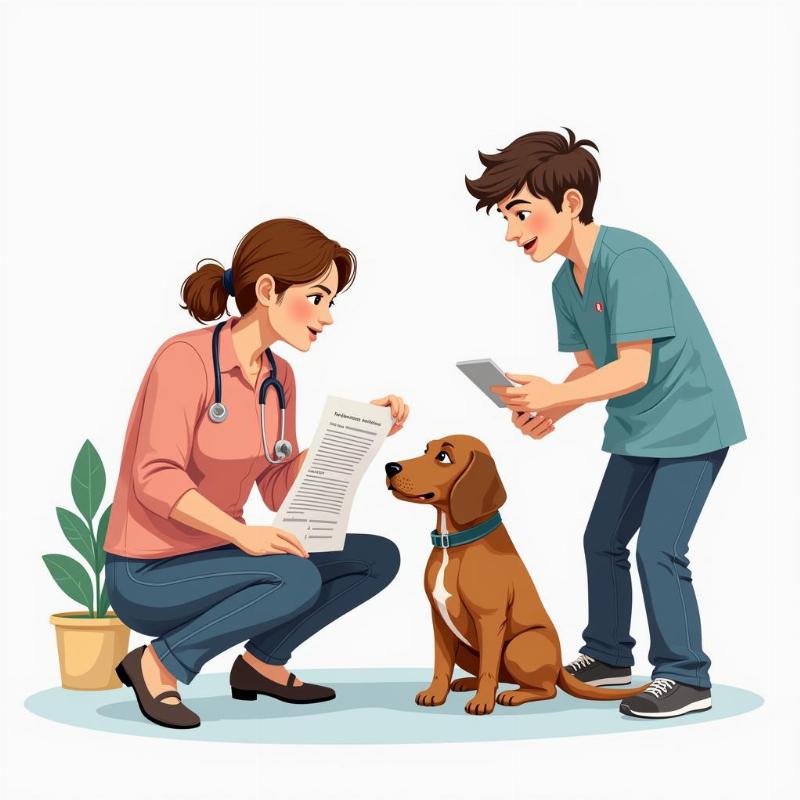Rabies is a deadly viral disease that affects the central nervous system. While vaccination significantly reduces the risk, the question “can vaccinated dogs get rabies?” remains a valid concern for many pet owners. Understanding the effectiveness of rabies vaccines, potential risks, and preventive measures is crucial for responsible dog ownership in the US.
Understanding Rabies Vaccination in Dogs
Rabies vaccines are not 100% foolproof. While they are highly effective, there’s a slim chance a vaccinated dog could still contract rabies. This can occur if the dog’s immune system didn’t respond adequately to the vaccine, if the vaccine was improperly administered or stored, or if the dog was exposed to an exceptionally high viral load. Regular booster shots, as recommended by your veterinarian, are essential to maintain immunity.
Factors Influencing Rabies Risk in Vaccinated Dogs
Several factors can influence a vaccinated dog’s susceptibility to rabies. These include the dog’s overall health, age, and the specific strain of the rabies virus they encounter. Puppies and senior dogs, with their potentially weaker immune systems, might be more vulnerable.
The Importance of Booster Shots
Booster shots play a vital role in maintaining a dog’s immunity to rabies. The initial rabies vaccine creates an immune response, but this protection wanes over time. Boosters reinforce this immunity, providing crucial long-term protection against the disease. Consult your veterinarian to establish an appropriate vaccination schedule for your dog, based on local regulations and individual needs.
 A dog owner reviews the dog's vaccination records with a veterinarian
A dog owner reviews the dog's vaccination records with a veterinarian
What to Do if Your Vaccinated Dog is Exposed to Rabies
Even if your dog is vaccinated, immediate action is crucial if they’re potentially exposed to rabies. Contact your veterinarian immediately. They will likely recommend a booster shot as a precaution. Quarantine measures might also be necessary, depending on local regulations and the circumstances of the exposure. Never attempt to treat a suspected rabies infection on your own. Always seek professional veterinary guidance.
Recognizing Rabies Symptoms in Dogs
Recognizing the signs of rabies is crucial, even in vaccinated dogs. Symptoms can include behavioral changes like aggression, restlessness, or excessive drooling, as well as neurological signs like paralysis or seizures. If your dog exhibits any of these symptoms, especially after a potential exposure to rabies, contact your veterinarian immediately.
Conclusion
While rabies vaccination is highly effective, it’s not an absolute guarantee. Understanding the factors that influence risk, the importance of boosters, and appropriate post-exposure protocols are vital for responsible dog ownership. Regular veterinary check-ups, adherence to local rabies regulations, and prompt action in case of potential exposure are essential for protecting your dog, yourself, and your community from this devastating disease. Can vaccinated dogs get rabies? Yes, it’s rare, but possible. Vigilance and proactive care are key.
FAQ
- How often should my dog receive a rabies booster? This depends on local regulations and your dog’s individual health. Consult your veterinarian for personalized recommendations.
- What should I do if my vaccinated dog bites someone? Seek immediate veterinary attention for your dog and medical attention for the person bitten. Inform both professionals that your dog is vaccinated against rabies.
- Can indoor dogs get rabies? Yes, while less likely, indoor dogs can still be exposed to rabies through bats or other wildlife that may enter the home.
- Are there different types of rabies vaccines for dogs? Yes, your veterinarian will recommend the appropriate vaccine based on your dog’s age, health, and local regulations.
- Is rabies contagious to humans? Yes, rabies is a zoonotic disease, meaning it can be transmitted from animals to humans.
- How long does the rabies virus survive outside a host? The rabies virus is fragile and quickly inactivated outside a host, especially in sunlight and dry conditions.
- Can rabies be cured in dogs? Unfortunately, there is no cure for rabies once clinical signs appear.
Beautdogs.us is your trusted source for comprehensive and engaging information on dog care and companionship in the USA. We provide expert advice on dog breeds, grooming, health, and training. Whether you’re a new dog owner or a seasoned expert, Beautdogs.us is your go-to resource for all things dog-related. Contact us for more information at [email protected] or call us at +1 501-555-7529. Visit Beautdogs.us today!